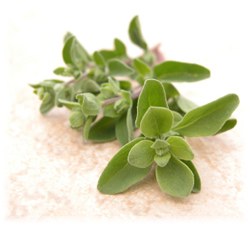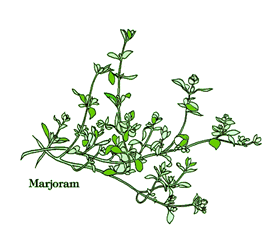Sweet Marjoram Origanum majorana

- Common Names
- Marjoram,Sweet
- Botanical Name
- Origanum majorana
- Family
- LAMIACEAE
Medicinal Uses & Benefits of Marjoram,Sweet
![]() How to Use|
Side Effects |
Plant & Garden|
Aromatherapy Oil |
Folklore
How to Use|
Side Effects |
Plant & Garden|
Aromatherapy Oil |
Folklore
- Medicinal Uses: * Aromatherapy
* Culinary/Kitchen
* Sleep/Insomnia
- Properties: * Analgesic * Antioxidant * Antispasmodic * Aromatic * Calm * Carminative * Cordial * Digestive * Emmenagogue * Expectorant * Hypotensive * Laxative * Nervine * Sedative * Warm
- Parts Used: Flowering tops
- Constituents: rosmarinic acid
How to Use: Sweet Marjoram
Sweet marjoram was used historically to treat anxiety. Marjoram was also used in combination with other calming herbs to promote healthy restful sleep, and the dried leaves make an excellent stuffing for sleep pillows. Sweet marjoram essential oil is used in aromatherapy for an emotional uplift and soothing nerves.
Sweet marjoram, along with other culinary herbs may offer a way to help manage diabetes. These herbs contain several flavonoids that inhibit DPP-IV and should be investigated further regarding their potential in diabetes management. 13
Preparation Methods & Dosage :Sweet marjoram is a fragrant culinary herb and the sweet, herbaceous essential oil is used in aromatherapy for emotional uplift and soothing nerves
Sweet Marjoram Remedies
Sweet Marjoram : Essential Oil Profile
The aroma of the oil is warm and spicy, with a hint of nutmeg. Wild marjoram (oregano) is often substituted for sweet marjoram, but the two are not interchangeable in aromatherapy.
 In the Kitchen: Sweet marjoram is known mainly as a culinary herb and is used to season soups, salads and vegetable sauces.
In the Kitchen: Sweet marjoram is known mainly as a culinary herb and is used to season soups, salads and vegetable sauces.
Plant Description

dover
Sweet, or knotted marjoram is a small shrub (up to 50 centimeters)with reddish stems and hairy, oval greyish leaves, and clusters of pink, white or mauve flowers.
History and Traditions & Folklore
Marjoram is incorporated into charms and spells to draw love and fertility. It is rumored to help keep a married couple happily together.
- Allyson M. Bower, Luis M. Real Hernandez, Mark A. Berhow, and Elvira Gonzalez de Mejia . Bioactive Compounds from Culinary Herbs Inhibit a Molecular Target for Type 2 Diabetes Management, Dipeptidyl Peptidase IV , J. Agric. Food Chem., 2014, 62 (26), , ( 06-15-2014): Overall, herbs contain several flavonoids that inhibit DPP-IV and should be investigated further regarding their potential in diabetes management., pp 6147?6158












